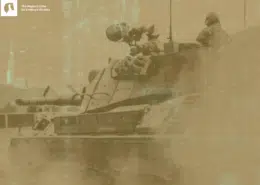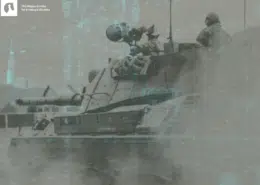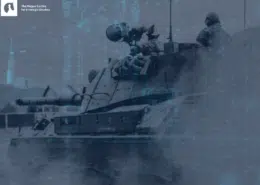 https://hcss.nl/wp-content/uploads/2025/06/NATOs-digital-capabilities-guest-papers-2.png
572
880
Stephanie Govaerts
https://hcss.nl/wp-content/uploads/2021/04/HCSS_Beeldmerk_Blauw_RGB1200-ppi-e1619025866259-300x300.png
Stephanie Govaerts2025-06-11 10:04:172025-06-12 16:58:00Command Confrontation: Considering China’s Evolving Command Capabilities and Implications for NATO
https://hcss.nl/wp-content/uploads/2025/06/NATOs-digital-capabilities-guest-papers-2.png
572
880
Stephanie Govaerts
https://hcss.nl/wp-content/uploads/2021/04/HCSS_Beeldmerk_Blauw_RGB1200-ppi-e1619025866259-300x300.png
Stephanie Govaerts2025-06-11 10:04:172025-06-12 16:58:00Command Confrontation: Considering China’s Evolving Command Capabilities and Implications for NATOOn 27 September, The Hague Centre for Strategic Studies and NATO HQ Supreme Allied Command Transformation co-hosted an event on “rethinking fire and manoeuvre”, a symposium focused on what the future of warfighting means for the alliance. Consisting of a day of discussions led by top defence and security experts, it convened representatives from across the alliance to support this work. Divided into three panels: (1) Warfighting across Shaping, Contesting and Fighting, (2) Technology and the Changing Fight, and (3) The Future of Command in NATO, it featured a keynote address and op-ed presentations by both European and North American experts. Scroll down for more info, and for links to the conference report, event papers, and interviews with the event’s invited experts.
The papers
Learning the right lessons for understanding the future of war
How should we think about the future of war? Recent and ongoing conflicts can give us clear lessons to follow but can also be deceptive and lead us down the wrong path. Understanding fire and manoeuvre into the future requires grasping the place of military operations in international politics, in the global economy, and in domestic affairs. Keynote speaker Ben Barry opened this event with considerations of how to navigate these intellectual challenges, supported in discussion with HCSS founder Professor Rob de Wijk and research director Dr. Tim Sweijs.
Warfighting across Shaping, Contesting and Fighting
Multi-domain operations is the primary fashion in today’s military thinking. Is it the right path, and if so how can it be implemented correctly? As with any concept, MDO has had to adapt to real-world challenges. It has evolved from initial brainstorming sessions to a comprehensive doctrine, reflecting changes in technology, budget constraints, and operational experiences. The implementation of MDO will rely on the dedication of the “doers” who will put it into practice. The concept is not static; it will continue to evolve as it faces the complexities of modern warfare.
Technology and the Changing Fight
The tools of warfare are naturally central to the study and preparation for the future of conflict. Assessing the actual impact that new tools will have on the character of warfare remains a challenge.
Predicting the impact of emerging and disruptive technologies (EDTs) on the character of warfighting is difficult. There are additional structural issues (and opportunities) in Europe’s defence industry, questions of balancing capability and capacity in defence planning, and the role of EDTs in contemporary warfare development.
The Future of Command in NATO
The security situation in Europe is placing demands on militaries and governments that have not been felt in decades. The need to coordinate across instruments of power and to command military forces requires rebuilding old and developing new skills and habits. Seen through the prism of NATO’s command and control approaches, there is work that remains to build more flexible and initiative-driven defence bureaucracies and military commands.
The Interviews
During the symposium on September 27th, HCSS Director of Research Dr Tim Sweijs also conducted interviews with several of the top defence and security experts invited. Rewatch the video’s here:
The Future of War and Lessons from the Russo-Ukraine War with Ben Barry (IISS)
“After Ukraine, no one should have any illusions that war is about combat.”
“NATO needs to have a concept of operations for the forward defence of European territory.”
Dwight “Buzz” Philips (RAND Corporation) on the concept of Multi-Domain Operations
“What are the tangible dilemmas that will force a choice that works to our advantage?”
“A lot of MDO tactics will be adaptation battles.”
Élie Tenenbaum (IFRI) on Capability vs. Capacity in Multi-Domain Operations
“MDO is not going to totally cancel the need for capacity by having a ‘super capability””
“If the end user doesn’t get military effects on the battlefield, then all of the data, the connection, the C2 we’ve developed is for nothing.”
Heather Venable (USAF ACSC) on MDO across Warfighting Contexts
“We need to hone in on what is it multi-domain operations is solving.”
“If no plan survives first contact with the enemy, how can we actually do MDO beyond that?”
Henrik Breitenbauch (Royal Danish Defence College) on NATO Command and Control
“We don’t have the trust, the political will to be able to integrate.”
“Command and control are as different as leadership and management.”
Jim Storr on Warfare, NATO and the Role of Command
“If you’re in a badly conceived organisation, then the process and the output are going to result in idiocy.”
“Most real life human situations are so unutterably complex, that actually nobody can handle them hands on.”
HCSS Experts

Tim Sweijs







